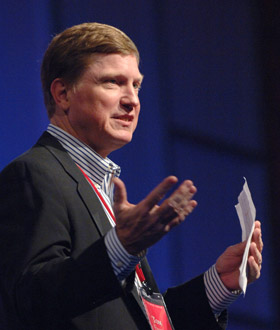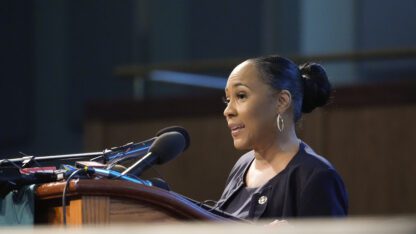Despite Vogtle Cost Overruns, Southern CEO Says Nuclear Power Still Smart Choice


Southern Company CEO Tom Fanning Thursday reconfirmed his belief in nuclear power, despite significant cost overruns and scheduling delays at the Plant Vogtle nuclear expansion project near Augusta.
Southern-subsidiary Georgia Power is managing that project.
Fanning, speaking at a luncheon hosted by the Atlanta Press Club, said pursuing nuclear, particularly after 2011’s Fukushima meltdown in Japan, has taken “vision and courage.”
“This will put us on the vanguard of modern power generation in America and I think it’ll be the blueprint for other projects to come,” said Fanning.
He said the project still represents billions in long-term savings for Georgia Power ratepayers.
“There have been some cost increases but the cost increases are nowhere near the benefits we’ve developed,” said Fanning.
Consumer and environmental groups, however, say that’s becoming increasingly unlikely. Official cost overruns total more than $700 million. Georgia Power is seeking to recoup those costs from its 2.4 million customers, but state regulators must sign off first. The Georgia Public Service Commission is scheduled to hold hearings on the matter beginning July 18.
Meanwhile, Georgia Power and its contractors are battling in court over more than $900 million of separate cost overruns associated with delays in federal licensing. Georgia Power’s share of that is more than $400 million. Consumer advocates worry ratepayers will be asked to bear those costs down the line.
With respect to the extra licensing costs, Fanning at the luncheon said, “the price increase to Georgia Power’s customers as a result of those cost increases is zero – no increase.”
But when later asked to clarify, Fanning said he was referring to costs not currently tied up in litigation. After the event, company officials couldn’t explain which specific costs Fanning was referring to, only saying, “the benefits that will be realized by Georgia Power customers as a result of the Vogtle project are expected to more than offset the costs associated with the schedule change.”
Fanning spoke just days after a federal appeals court upheld the project’s construction permit. Environmental groups last year sued to stall the project, claiming federal regulators failed to take into account new safety and cost concerns post-Fukushima.
Fanning said the new Vogtle reactors will be the safest in the country, and any new regulations aimed at addressing post-Fukushima concerns would apply primarily to older units.
“Fukushima was old nuclear technology,” said Fanning.
In the event of new regulations, Fanning said nuclear still makes financial sense for ratepayers, even if it means costly upgrades to older units.
“Everything I know right now is overwhelmingly positive to make the capital modifications and keep the units running.”
9(MDAxODM0MDY4MDEyMTY4NDA3MzI3YjkzMw004))





